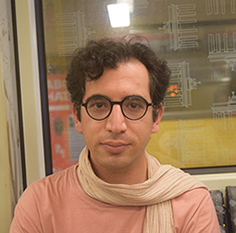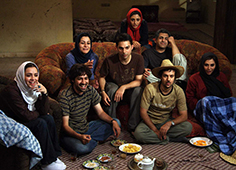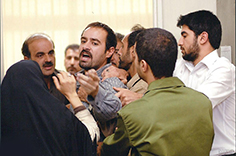
-
Hamed Soleimanzadeh, Jury Member of the 39th Warsaw International Film Festival
 Soleimanzadeh's colleagues on the FIPRESCI jury include MIKE NAAFS (a Dutch critic) and DINU-IOAN NICULA (a Romanian critic). It is worth noting that Hamed Soleimanzadeh is the sole Iranian filmcritic on the international stage who has served as a jury member in more than twenty renowned global film festivals, including Cannes, Berlinale, Karlovy Vary, and the Golden Globe Awards, among others, making him a record holder in this regard.
Soleimanzadeh's colleagues on the FIPRESCI jury include MIKE NAAFS (a Dutch critic) and DINU-IOAN NICULA (a Romanian critic). It is worth noting that Hamed Soleimanzadeh is the sole Iranian filmcritic on the international stage who has served as a jury member in more than twenty renowned global film festivals, including Cannes, Berlinale, Karlovy Vary, and the Golden Globe Awards, among others, making him a record holder in this regard.
-
FIPRESCI Critsics' Perspective on Iranian Independent Cinema (Part- Twelve)
_102.jpg) Valerie Ganne
Journalist and Film Critic/France
How did you become acquainted with Iranian Cinema? And when was the first time you watched an Iranian film?
I discovered Iranian cinema when I was 25 and with Abbas Kiarostami’s films. He paved the path for the other Iranian directors. Iranian cinema has become an important one for me for almost 30 years, and I’ve been following it for years.
Valerie Ganne
Journalist and Film Critic/France
How did you become acquainted with Iranian Cinema? And when was the first time you watched an Iranian film?
I discovered Iranian cinema when I was 25 and with Abbas Kiarostami’s films. He paved the path for the other Iranian directors. Iranian cinema has become an important one for me for almost 30 years, and I’ve been following it for years.
-
FIPRESCI Critsics' Perspective on Iranian Independent Cinema (Part- Eleven)
 Kostas G. Karderinis
Film Critic/Greece
Which of the Iranian filmmakers do you like the most?
Without any order: Dariush Mehrjui, Mohsen Makhmalbaf and his entire family, Abbas Kiarostami, Bahman GHobadi, Asghar Farhadi, Manijeh Hekmat, Rakhshan Banietemad, Shirin Neshat, Shoja Azari, Marjan Satrapi, Jafar Panahi, Babak Payami, Majid Majidi, Kianoush Ayari, Mohammad Rasoulof, Amir Naderi, Ramin Bahrani, Abolfazal Jalili, Ebrahim Forouzesh, Parviz Shahbazi, Mohsen Amiryoussefi, Hossein Shahbi, Vahid Jalilvand, Ali Asgari, Sadaf Foroughi, Reza Mirkarimi, and Ali Souzandeh.
Some directors are out of the country and can make films with no limitations. Some others work in silence
Kostas G. Karderinis
Film Critic/Greece
Which of the Iranian filmmakers do you like the most?
Without any order: Dariush Mehrjui, Mohsen Makhmalbaf and his entire family, Abbas Kiarostami, Bahman GHobadi, Asghar Farhadi, Manijeh Hekmat, Rakhshan Banietemad, Shirin Neshat, Shoja Azari, Marjan Satrapi, Jafar Panahi, Babak Payami, Majid Majidi, Kianoush Ayari, Mohammad Rasoulof, Amir Naderi, Ramin Bahrani, Abolfazal Jalili, Ebrahim Forouzesh, Parviz Shahbazi, Mohsen Amiryoussefi, Hossein Shahbi, Vahid Jalilvand, Ali Asgari, Sadaf Foroughi, Reza Mirkarimi, and Ali Souzandeh.
Some directors are out of the country and can make films with no limitations. Some others work in silence
-
FIPRESCI Critsics' Perspective on Iranian Independent Cinema (Part- Ten)
_100.jpg) Stephen Aspeling
Film Critic/South Africa
How much do you know about Iranian culture? Do you know any Iranian artists out of the field of cinema?
I am from South Africa, that is, the country where television started operating in 1976 with extensive censorship and a history of national and international discrimination. Due to this reason and some other obstacles, my access to Iranian history, culture, and art was extremely limited. I literally know Iran via its films.
Stephen Aspeling
Film Critic/South Africa
How much do you know about Iranian culture? Do you know any Iranian artists out of the field of cinema?
I am from South Africa, that is, the country where television started operating in 1976 with extensive censorship and a history of national and international discrimination. Due to this reason and some other obstacles, my access to Iranian history, culture, and art was extremely limited. I literally know Iran via its films.
-
FIPRESCI Critsics' Perspective on Iranian Independent Cinema (Part- Nine)
 Ron Fogel
University Lecturer and Film Critic
What are the main factors for the success of Iranian cinema at variety of film festivals in the world?
First, I must name the high quality of the films. Also, I think all cinema lovers around the world would like to know the process of filmmaking in Iran, despite censorship and restrictions. Screening Iranian films at festivals is a reminder of freedom of speech and art. I also think that foreign audiences can easily connect with Iranian films since they can see how an ordinary person (not wealthy or powerful) leaves his ordinary life behind in search of a new adventure.
Ron Fogel
University Lecturer and Film Critic
What are the main factors for the success of Iranian cinema at variety of film festivals in the world?
First, I must name the high quality of the films. Also, I think all cinema lovers around the world would like to know the process of filmmaking in Iran, despite censorship and restrictions. Screening Iranian films at festivals is a reminder of freedom of speech and art. I also think that foreign audiences can easily connect with Iranian films since they can see how an ordinary person (not wealthy or powerful) leaves his ordinary life behind in search of a new adventure.
-
FIPRESCI Critsics' Perspective on Iranian Independent Cinema (Part- Eight)
_98.jpg) Pelagie Ngonana
Journalist and Film Critic/Cameroon
What are the main factors for the success of Iranian cinema at a variety of film festivals in the world?
In my opinion, Iranian cinema has an amazing artistic and technical quality. It’s concerned with the details. In addition, it goes beyond the author's cinema and the genre rules of cinema, which is why it has attracted the attention of international festivals. Despite censorship and some restrictions, Iranian filmmakers have successfully and bravely won great titles.
Pelagie Ngonana
Journalist and Film Critic/Cameroon
What are the main factors for the success of Iranian cinema at a variety of film festivals in the world?
In my opinion, Iranian cinema has an amazing artistic and technical quality. It’s concerned with the details. In addition, it goes beyond the author's cinema and the genre rules of cinema, which is why it has attracted the attention of international festivals. Despite censorship and some restrictions, Iranian filmmakers have successfully and bravely won great titles.
-
FIPRESCI Critsics' Perspective on Iranian Independent Cinema (Part- Seven)
 Erdogan Mitrani
Film critic and Architect/Turkey
How did you become acquainted with Iranian Cinema? And when was the first time you watched an Iranian film?
I heard about the emersion new wave of Iranian cinema, and I watched two Iranian films about 30 years ago at the Istanbul Film Festival. The first one was Mohsen Makhmalbaf’s The Cyclist. The thing that impressed me deeply in that film was the movement from a personal, surreal, and tragic story to making caustic political criticisms. The second one, which I can say was like a great discovery for me, was Bahram Beyzaei’s Bashu, the Little Stranger. I fell in love with Beyzaei’s extremely poetic and cinematic language. Also, I understood that Iran is not only a very large country with the historical background of an ancient empire, but also a continent with a variety of languages, races, and cultures coexisting together. After that experience, I have watched almost all of Beyzaei’s works, and he is my number one director among the old generation of Iranian filmmakers.
I’ve become acquainted with the new generation of Iranian filmmakers through the works of Mohsen Makhmalbaf, his wife and daughters, Abbas Kiarostami, Jafar Panahi, Mohammad Rasoolof, Majid Majidi, Asghar Farhadi and a few others. Their creativity, simplicity, and honesty have impressed me to my heart. I’m sorry to say this but creativity mostly thrives in constraint.
Erdogan Mitrani
Film critic and Architect/Turkey
How did you become acquainted with Iranian Cinema? And when was the first time you watched an Iranian film?
I heard about the emersion new wave of Iranian cinema, and I watched two Iranian films about 30 years ago at the Istanbul Film Festival. The first one was Mohsen Makhmalbaf’s The Cyclist. The thing that impressed me deeply in that film was the movement from a personal, surreal, and tragic story to making caustic political criticisms. The second one, which I can say was like a great discovery for me, was Bahram Beyzaei’s Bashu, the Little Stranger. I fell in love with Beyzaei’s extremely poetic and cinematic language. Also, I understood that Iran is not only a very large country with the historical background of an ancient empire, but also a continent with a variety of languages, races, and cultures coexisting together. After that experience, I have watched almost all of Beyzaei’s works, and he is my number one director among the old generation of Iranian filmmakers.
I’ve become acquainted with the new generation of Iranian filmmakers through the works of Mohsen Makhmalbaf, his wife and daughters, Abbas Kiarostami, Jafar Panahi, Mohammad Rasoolof, Majid Majidi, Asghar Farhadi and a few others. Their creativity, simplicity, and honesty have impressed me to my heart. I’m sorry to say this but creativity mostly thrives in constraint.
-
FIPRESCI Critsics' Perspective on Iranian Independent Cinema (Part- Six)
_96.jpg) Hsin Wang
Writer and Film Critic/Taiwan
What are the main factors for the success of Iranian cinema at a variety of film festivals in the world?
What are the main factors for the success of Iranian cinema at a variety of film festivals in the world?
In my opinion, Iranian cinema has an amazing artistic and technical quality. It’s concerned with the details. In addition, it goes beyond the author's cinema and the genre rules of cinema, which is why it has attracted the attention of international festivals. Despite censorship and some restrictions, Iranian filmmakers have successfully and bravely won great titles.
Hsin Wang
Writer and Film Critic/Taiwan
What are the main factors for the success of Iranian cinema at a variety of film festivals in the world?
What are the main factors for the success of Iranian cinema at a variety of film festivals in the world?
In my opinion, Iranian cinema has an amazing artistic and technical quality. It’s concerned with the details. In addition, it goes beyond the author's cinema and the genre rules of cinema, which is why it has attracted the attention of international festivals. Despite censorship and some restrictions, Iranian filmmakers have successfully and bravely won great titles.
-
FIPRESCI Critsics' Perspective on Iranian Independent Cinema (Part- Five)
_95.jpg) Jean-Max Mejean
Writer and Film Critic/France
How much do you know about Iranian culture? Do you know any Iranian artists out of the field of cinema?
I know that Iran has a much enriched cultural background. I studied about Iran and its monarchy during my school days. Iran is a Middle Eastern country that has always amazed the Western world with its wealth and art. In the 80s, and during the Revolution, we got more familiar with Iran because Ayatollah Khomeini was staying in Paris at that time, and he lived in Neauphle-le-Château, near Marguerite Duras’s house. Those days, we mostly knew the writers who had fled from the country and had taken refuge in France; writers such as Serge Rezvani. Through animated films, such as Marjane Satrapi's Persepolis, I learned more about Iran's situation after the Islamic Revolution. Among other Iranian well-known artists, I can name Pouya Ali Nia (Musician), Paria Vatankhah (visual artist), Golshifteh Farahani (actress), and Nahal Tajadod (writer) who was Jean-Claude Carrière’s wife. I know these people because some of these Iranian artists live in France. Unfortunately, I don’t know much about Iranian contemporary art, except for the cinema field.
Jean-Max Mejean
Writer and Film Critic/France
How much do you know about Iranian culture? Do you know any Iranian artists out of the field of cinema?
I know that Iran has a much enriched cultural background. I studied about Iran and its monarchy during my school days. Iran is a Middle Eastern country that has always amazed the Western world with its wealth and art. In the 80s, and during the Revolution, we got more familiar with Iran because Ayatollah Khomeini was staying in Paris at that time, and he lived in Neauphle-le-Château, near Marguerite Duras’s house. Those days, we mostly knew the writers who had fled from the country and had taken refuge in France; writers such as Serge Rezvani. Through animated films, such as Marjane Satrapi's Persepolis, I learned more about Iran's situation after the Islamic Revolution. Among other Iranian well-known artists, I can name Pouya Ali Nia (Musician), Paria Vatankhah (visual artist), Golshifteh Farahani (actress), and Nahal Tajadod (writer) who was Jean-Claude Carrière’s wife. I know these people because some of these Iranian artists live in France. Unfortunately, I don’t know much about Iranian contemporary art, except for the cinema field.
-
FIPRESCI Critsics' Perspective on Iranian Independent Cinema (Part- Four)
_94.jpg) Usman Ghafoor
Film Critic/Pakistan
How did you become acquainted with Iranian Cinema? And when was the first time you watched an Iranian film?
My first encounter with Iranian cinema goes back to the mid-2000s and Majid Majidi’s Children of Heaven. I was moved by the film's simplicity and its lack of any dramatic frills or embellishments in portraying life in a city in Iran, and particularly its child heroes. After watching Majid Majidi’s The Color of Paradise and Baran, Abbas Kiarostami’s The Wind Will Carry Us and Taste of Cherry, and Asghar Farhadi’s A Separation and The Salesman, I became a huge fan of Iranian cinema. I didn’t even care if the DVDs had English subtitles or not because it is impossible not to be influenced by the visual language of the films.
Usman Ghafoor
Film Critic/Pakistan
How did you become acquainted with Iranian Cinema? And when was the first time you watched an Iranian film?
My first encounter with Iranian cinema goes back to the mid-2000s and Majid Majidi’s Children of Heaven. I was moved by the film's simplicity and its lack of any dramatic frills or embellishments in portraying life in a city in Iran, and particularly its child heroes. After watching Majid Majidi’s The Color of Paradise and Baran, Abbas Kiarostami’s The Wind Will Carry Us and Taste of Cherry, and Asghar Farhadi’s A Separation and The Salesman, I became a huge fan of Iranian cinema. I didn’t even care if the DVDs had English subtitles or not because it is impossible not to be influenced by the visual language of the films.
|
|
October, 2023
September, 2023
January, 2017
December, 2015
December, 2014
January, 2013
July, 2012
August, 2011
December, 2010
June, 2010
January, 2010
October, 2009
May, 2009
February, 2009
January, 2009
November, 2008
October, 2008
July, 2008
March, 2008
January, 2008
December, 2007
November, 2007
September, 2007
|
|
|

